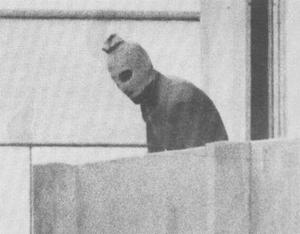
"Our greatest hopes and our worst fears are seldom realized. Our worst fears have been realized tonight. They've now said that there were eleven hostages; two were killed in their rooms yesterday morning, nine were killed at the airport tonight. They're all gone."
- Jim McKay, ABC sports; September 6, 1972
With the Winter Olympic games soon to start in Turin, Italy; riots in the Muslim world about non-Muslim perceptions of Muslims as terrorists thanks to insults to Islam in the form of cartoon renditions of the prophet Muhammad; the Iranian president’s repeated calls for Israel’s destruction; the election of an Arab terrorist group opposed to Israel’s existence to the Palestinian parliament as well as ongoing Israeli operations against terrorists, could there be a timelier movie than Munich?

Of course, this is a review of sorts for
In my honest opinion, Munich Beirut
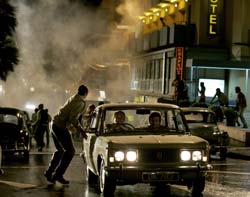 It was a given from pre-production that this movie would strike a particular chord, or nerve, with Jews in particular.
It was a given from pre-production that this movie would strike a particular chord, or nerve, with Jews in particular.Munich’s dramatizing the horror of the brutal terrorism that did not derail the Olympic Games in West Germany over 33 years ago, as well as the swift response of Israel to that heinous attack – and a not-so-surprising cameo of the Twin Towers in New York, 1973 - makes it a movie that not only calls out for an understanding from all people of the threat of terrorism, but also one that issues a call for our acknowledgement of the necessary limits that we as humans of any religion or nationality must place on ourselves when we accept that human life has an intrinsic value.
Munich shows that we can sometimes out of necessity overstep those limits to defend ourselves or defend our country and people, but in the end we often risk paying a heavy price for doing so.
Eric Bana (as Avner) and the other actors portraying the Israeli strike team – including Daniel Craig, who is to play James Bond in the next 007 movie, Casino Royale – and Avner’s mother and wife, humanize Jewish Israelis in a way that I can only really compare to the movie Exodus, and the book of the same name (Geoffrey Rush’s character isn’t all that likeable – but then again, not all movie characters are likeable). Granted, there is the perception that Jews must always have some sort of guilt about something, and one fault of this movie is that at one point it seems to go overboard showing this. Be that as it may, more often than not, Israelis are unfairly portrayed in the media and elsewhere simply as uncaring , warmongering soldiers (or to put it a bit differently, we Jews are either meek, conspiratorial, brutal, or some combination of those three).
On the whole this was refreshingly not so with Munich Munich
Terrorism is a human problem, after all.
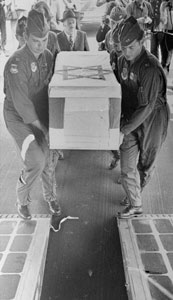
Terrorism is a human problem, after all.

And even though it is blood-soaked at times, the film doesn’t go out of its way to glorify the violence of fighting terrorism, nor does it desensitize the audience to the brutality of terrorist attacks themselves. How can realistically showing death be gratuitous in a film like this? Anyway, Munich isn’t exactly Schindler’s List meets Saving Private Ryan either – Jews with guns and bombs entering Europe and killing those who plot to kill them. Still, one would be forgiven for thinking this is the message of the film when Daniel Craig, as “Steve”, sums up for understanding Israel’s motives in going after the Black September terrorist planners – “Don’t fuck with the Jews” – as the counter-terrorist team “celebrates” following a successful operation against one of the Palestinian planners of the Munich massacre.
The scenes of the actual terrorist attack that brought about the events the movie chronicle, the taking of 11 Israeli athletes as hostages by Palestinian terrorists at the 1972 Summer Olympics in Munich, West Germany, are spread throughout the movie and pack a punch, both to the heart and the eardrums, despite their taking up only a smidgen of the overall movie’s length.
Everything, from the way the terrorists enter the Olympic Village to their entering the Israelis’ rooms to the tragic end of the hostage crisis at Furstenfeldbruck airport (thanks in no small part to West German blundering) is heart-rending to the sympathetic or innocent viewer. The combination of historical footage (news broadcasts of the actual event, including images of a ski-masked terrorist, a still from the actual footage I’ve included in this post) and actors portraying the real people in the movie only added to the impact of each scene as it played out on screen. It still affects me, 24 hours after having seen the movie.
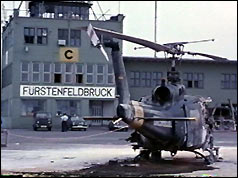

Munich was terrific. It's not perfect – there are a few things I could criticize, or label as a bit disturbing – but my 35 shekels were well spent on this movie. As were the 4.5 shekels on the ice cream bar I bought during the intermission. Yeah…they have intermissions here. No matter the length of the movie. Israelis need their smoke break.
Speaking of which, it was very surreal for me to see this movie in Israel , as an American Jew who has adopted Israel Israel
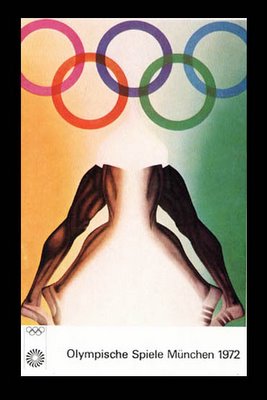

The scenes of the movie set in Israel itself are what I speak of: to hear Hebrew spoken (however briefly) on the screen in a Hollywood movie (thankfully not similar to the way Bruce Willis does it in The Whole Ten Yards)….to see Israel of the early 70s portrayed as faithfully as possible (thanks to set pieces and not actual on-location shooting in Israel), with Hebrew signage and posters, soldiers in uniform, Hebrew subtitles on TV sets, etc…well, it was surreal for me, like I said. Unreal and yet so very real for me at the same time.
It was fitting that as my co-worker friends and I saw a movie about the State of Israel in the 1970s chasing down and killing terrorists, the State of Israel sent a couple of Islamic Jihad terrorists in the Gaza Strip one-way tickets to Allah in the form of a missile strike. That alone reminds this American in Israel that Munich, a work of fact-based fiction (whatever the accuracy of its sources) is much less a Hollywood thriller, much more a dramatized chapter of a real-life,
ongoing war.
And while I support the methods used to fight Islamic terrorism, it is fair to ask sometimes,
"Sports lost its innocence that day in Munich." - Jim McKay to the Associated Press in 2002
ongoing war.
And while I support the methods used to fight Islamic terrorism, it is fair to ask sometimes,
"Sports lost its innocence that day in Munich." - Jim McKay to the Associated Press in 2002

No comments:
Post a Comment